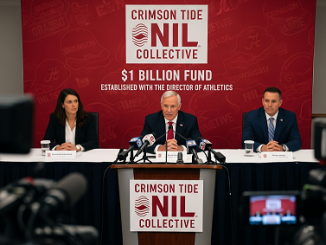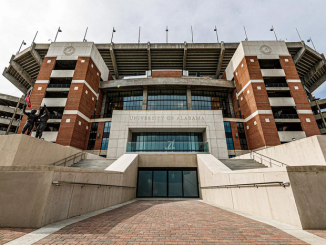
Alabama wide receiver Ryan Williams is charting a different course, using his considerable Name, Image, and Likeness (NIL) success to fund a major community outreach initiative in his hometown of Mobile, Alabama.
This philanthropic focus, combined with his dedication to the Crimson Tide program, has earned the sophomore the unofficial title of “leader” from the coaching staff, a wholesome counter-narrative in the increasingly transactional landscape of college football.
While a widely circulated report claiming a $5 million donation was later retracted, Williams has taken confirmed steps to leverage his platform for tangible community impact.

Reports indicate a collaborative, multi-million dollar effort in the Mobile area aimed at establishing support centers focusing on transitional housing, job training, and mental health services. This dedication to foundational change over flash is a clear signal of his personal priorities.
Crimson Tide Head Coach Kalen DeBoer has been quick to recognize Williams’ maturation on and off the field. When speaking about Williams, DeBoer emphasized the receiver’s increasing influence beyond his electrifying play.
“The leadership piece is just something I’m really proud of with how he’s trying to continue to grow,” DeBoer noted during a recent media appearance, praising Williams’ commitment to becoming “stronger, more durable,” and a positive force in the locker room. This emphasis on character development and team culture is a welcome refrain for an Alabama program seeking stability under new leadership.
Williams’ influence extends past mere example; his willingness to be an emotional and ethical compass for a young team a true leader provides a moral center often lost amid the frenzy of NIL earnings.
Williams, who garnered Freshman All-American honors and signed lucrative NIL deals with national brands like Nike, Beats by Dre, and New Era, has emerged as one of the nation’s top-earning college athletes, with a reported valuation of over $2.5 million.
Unlike many peers who use this capital for personal gain or to leverage better deals elsewhere, Williams has directed his focus toward community development in Mobile County, where he grew up.
The choice is particularly notable given the current state of college football, where top players often test the transfer portal market after a successful season to secure a higher annual salary.
Williams’ decision to stay in Tuscaloosa, despite having one of the highest NIL valuations in the sport and facing the temptation of a potential “pay raise” at other top programs, underscores a commitment to his home state and the legacy of the Alabama program. Sources report his salary is near the $2 million mark, a number that arguably represents a “bargain” considering his value and the inflated rates offered by some competing schools.
Williams’ actions signal a broader potential for the NIL era not just as a mechanism for player compensation, but as a powerful engine for philanthropy.
By channeling a significant portion of his brand power and financial success toward sustained community outreach, he is attempting to redefine the role of the modern college athlete as a civic leader and community benefactor.
His story provides a hopeful, human dimension to the Name, Image, and Likeness discussion, proving that the opportunity for financial freedom can coexist with deep-rooted loyalty and a desire to serve. As the season progresses, Williams’ plays on the field will no doubt generate headlines, but it is his growing leadership and commitment to his community that may ultimately define his legacy in Tuscaloosa.



Be the first to comment